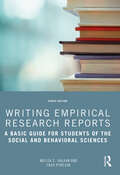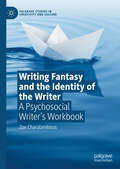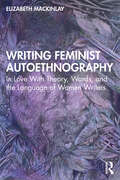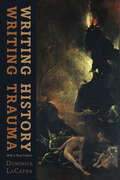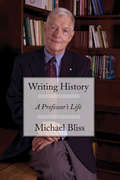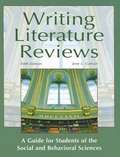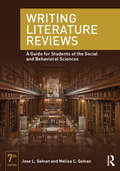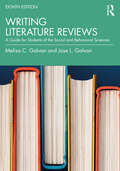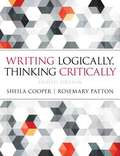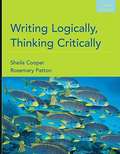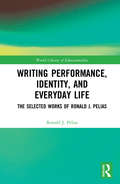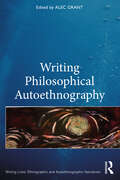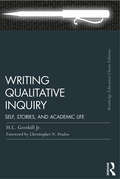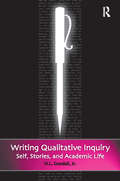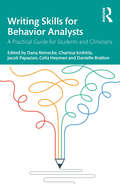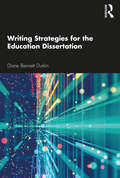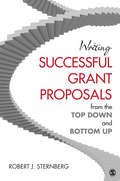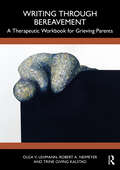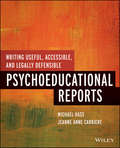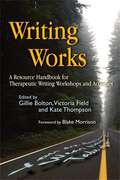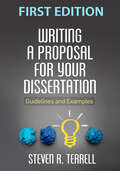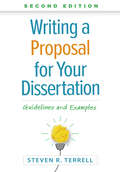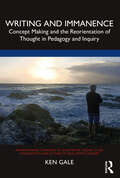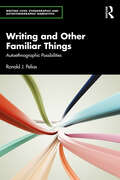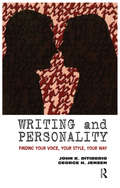- Table View
- List View
Writing Empirical Research Reports: A Basic Guide for Students of the Social and Behavioral Sciences
by Fred Pyrczak Melisa C. GalvanWriting Empirical Research Reports: A Basic Guide for Students of the Social and Behavioral Sciences, Ninth Edition, offers clear and practical guidance on how to write research proposals, reports, theses, and dissertations. The book describes the types of information that should be included, how this information should be expressed, and where various types of information should be placed within a research report. The organization is designed to walk students through all the elements required when writing an original research report for a class, for a thesis/dissertation, or for publication. Most guidelines are illustrated with examples from actual (and recent) research reports published in peer-reviewed journals across the social and behavioral sciences. The new edition includes fully updated examples and chapter exercises, expanded material on qualitative methods, significant new material on research ethics, and new content on online research including social media. Accompanied by online resources for students and instructors, Writing Empirical Research Reports is ideal for use in research methods courses, thesis/dissertation preparation courses, research seminars where writing a research report is a culminating activity, and any graduate-level seminar in which the instructor covers the vital components necessary to prepare a research manuscript for submission for publication.
Writing Fantasy and the Identity of the Writer: A Psychosocial Writer’s Workbook (Palgrave Studies in Creativity and Culture)
by Zoe CharalambousThis book presents the innovative pedagogy of Writing Fantasy: a method for exploring and shifting one’s identity as a writer. The book draws on qualitative research with undergraduate creative writing students and fills a gap in the literature exploring creative writing pedagogy and creative writing exercises. Based on the potential to shift writer identity through creative writing exercises and the common ground that these share with the stance of the Lacanian analyst, the author provides a set of guidelines, exercises and case studies to trace writing fantasy, evidenced in one’s creative writing texts and responses about creative writing. This innovative work offers fresh insights for scholars of creativity, Lacan and psychosocial studies, and a valuable new resource for students and teachers of creative writing.
Writing Feminist Autoethnography: In Love With Theory, Words, and the Language of Women Writers
by Elizabeth MackinlayWriting Feminist Autoethnography explores the personal-is-political relationship between autoethnography and feminist theory and practice. Each chapter introduces the lives and works of a range of feminist thinkers and writers and considers the ways in which their thinking and writing might come to be in relation with our own personal-is-political thinking and writing work as feminist autoethnographers. The book begins with an acknowledgement of the author’s positionality as a white-settler-colonial-woman in relation with Yanyuwa, Garrwa, Mara and Kudanji Aboriginal women. This positionality has continued to resonate deeply with the responses and sensibilities the author holds as a feminist autoethnographer to move beyond coloniality. She explores the writing of Virginia Woolf, Simone Weil, Simone de Beauvoir, Hélène Cixous, Kathleen Stewart, bell hooks and Ruth Behar, with critical affect to embrace, embody and engage with feminist thinking, wondering and feeling. The book creatively and performatively explores what it means to live a feminist life as an autoethnographer. This book will define and conceptualize feminist autoethnography for all qualitative researchers, especially those interested in critical autoethnography, and scholars in gender studies and communication.
Writing History, Writing Trauma (Parallax: Re-visions of Culture and Society)
by Dominick LaCapraAn updated edition of a major work in trauma studies.Trauma and its aftermath pose acute problems for historical representation and understanding. In Writing History, Writing Trauma, Dominick LaCapra critically analyzes attempts by theorists and literary critics to come to terms with trauma and with the crucial role post-traumatic testimonies—notably Holocaust testimonies—assume in thought and in writing. These attempts are addressed in a series of six interlocking essays that adapt psychoanalytic concepts to historical analysis, while employing sociocultural and political critique to elucidate trauma and its aftereffects in culture and in people. This updated edition includes a substantive new preface that reconsiders some of the issues raised in the book.
Writing History: A Professor’s Life
by Michael BlissOne of Canada’s best-known and most-honoured biographers turns to the raw material of his own life in Writing History. A university professor, prolific scholar, public intellectual, and frank critic of the world he has known, Michael Bliss draws on extensive personal diaries to describe a life that has taken him from small-town Ontario in the 1950s to international recognition for his books in Canadian and medical history. His memoir ranges remarkably widely: it encompasses social history, family tragedy, a critical insider’s view of university life, Canadian national politics, and, above all, a rare glimpse into the craftsmanship that goes into the research and writing of history in our time. Whether writing about pigs and millionaires, the discovery of insulin, sleazy Canadian politicians, or the founders of modern medicine and brain surgery, Michael Bliss is noted for the clarity of his prose, the honesty of his opinions, and the breadth of his literary interests.
Writing Literature Reviews: A Guide for Students of the Social and Behavioral Sciences
by Jose L. GalvanThis easy-to-follow guide instructs students in the preparation of literature reviews for term projects, theses, and dissertations. There are numerous examples from published literature reviews that illustrate the guidelines discussed in this text. New to this edition: Most of the examples have been updated with material from recently published research. Also new: Seven new model literature reviews for discussion and evaluation have been added. Guides students in the preparation of literature reviews for term projects, theses, and dissertations. Chapters are conveniently divided into easy-to-follow guidelines, sequential steps, or checklists. Numerous examples throughout the book show students what should and should not be done when writing reviews. Emphasizes critical analysis of reports of empirical research in academic journals-making it ideal as a supplement for research methods courses. This book makes it possible for students to work independently on a critical literature review as a term project. Nine model literature reviews at the end of the book provide the stimulus for homework assignments and classroom discussions. The activities at the end of each chapter keep students moving toward their goal of writing a polished, professional review of academic literature. New to this edition: Most of the examples have been updated with material from recently published research. Also new: Seven new model literature reviews for discussion and evaluation have been added.
Writing Literature Reviews: A Guide for Students of the Social and Behavioral Sciences
by Jose L. Galvan Melisa C. GalvanThis useful guide educates students in the preparation of literature reviews for term projects, theses, and dissertations. The authors provide numerous examples from published reviews that illustrate the guidelines discussed throughout the book. New to the seventh edition: Each chapter breaks down the larger holistic review of literature exercise into a series of smaller, manageable steps Practical instructions for navigating today’s digital libraries Comprehensive discussions about digital tools, including bibliographic and plagiarism detection software Chapter activities that reflect the book’s updated content New model literature reviews Online resources designed to help instructors plan and teach their courses (www.routledge.com/9780415315746).
Writing Literature Reviews: A Guide for Students of the Social and Behavioral Sciences
by Jose L. Galvan Melisa C. GalvanWriting Literature Reviews: A Guide for Students of the Social and Behavioral Sciences provides students with practical guidelines for the complex process of writing literature reviews for course projects, theses or dissertations, and research manuscripts for publication.This bestselling book follows a systematic, natural progression of steps and focuses on the writing of critical reviews of original research. Steps and guidelines are organized sequentially and are illustrated with examples from a wide range of actual (and recent) academic journals. Each chapter is designed to scaffold and help students develop a set of specific products that will contribute to a competent literature review.Writing Literature Reviews is ideal for use in research methods courses, thesis/dissertation preparation courses, research seminars where a literature review is expected as a culminating activity, or any course in which the instructor needs to cover the vital components necessary to prepare a literature review for a variety of audiences. The book is supported by online materials including self-test quizzes for students, and lecture slides for instructors.New to this edition: Expanded sections on plagiarism and selection bias. Updated chapter examples and references. Expanded discussion of digital research tools. Discussion of the implications of AI use. New model literature reviews that complement existing reviews that our longtime adopters have found useful. These can serve as the basis for classroom discussions and as source material for end-of-chapter activities, as needed.
Writing Logically, Thinking Critically
by Sheila Cooper Rosemary PattonThis concise, accessible text teaches students how to write logical, cohesive arguments and how to evaluate the arguments of others. Integrating writing skills with critical thinking skills, this practical book teaches students to draw logical inferences, identify premises and conclusions and use language precisely. Students also learn how to identify fallacies and to distinguish between inductive and deductive reasoning. Ideal for any composition class that emphasizes argument, this text includes coverage of writing style and rhetoric, logic, literature, research and documentation.
Writing Logically, Thinking Critically (6th Edition)
by Sheila Cooper Rosemary PattonThis concise, accessible text teaches students how to write logical, cohesive arguments and how to evaluate the arguments of others. Integrating writing skills with critical thinking skills, this practical book teaches students to draw logical inferences, identify premises and conclusions and use language precisely. Students also learn how to identify fallacies and to distinguish between inductive and deductive reasoning. Ideal for any composition class that emphasizes argument, this text includes coverage of writing style and rhetoric, logic, literature, research and documentation.
Writing Performance, Identity, and Everyday Life: The Selected Works of Ronald J. Pelias
by Ronald J. PeliasWriting Performance, Identity, and Everyday Life invites the reader into Ronald J. Pelias’ world of artistic and everyday performance. Calling upon a broad range of qualitative methods, these selected writings from Pelias submerge themselves in the evocative and embodied, in the material and consequential, often creating moving accounts of their topics. The book is divided into four sections: Foundational Logics, Performance, Identity, and Everyday Life. Part I addresses the methodological underpinnings of the book, focusing on the ‘touchstones’ that inform Pelias’ work: performative, autoethnographic, poetic, and narrative methods. These directions push the researcher toward empathic engagement, a leaning toward others; using the literary to evoke the cognitive and affective aspects of experience; and an ethical sensibility located in social justice. Parts II–IV focus on artistic and everyday life performances, including discussions of the disciplinary shift from the oral interpretation of literature to the field of performance studies; empathy and the actor’s process; conceptions of performance; the performance of race, gender, and sexuality; and performances in interpersonal relations and academic circles. By the end, readers will see Pelias demonstrate the power of qualitative methods to engage and to present alternative ways of being. Pelias’ work shows us how to understand and feel the evocative strength of thinking performatively.
Writing Philosophical Autoethnography (Writing Lives: Ethnographic and Autoethnographic Narratives)
by Alec GrantWriting Philosophical Autoethnography is the result of Alec Grant’s vision of bringing the disciplines of philosophy and autoethnography together. This is the first volume of narrative autoethnographic work in which invited contributing authors were charged with exploring their issues, concerns, and topics about human society, culture, and the material world through an explicitly philosophical lens. Each chapter, while written autoethnographically, showcases sustained engagement with philosophical arguments, ideas, concepts, theories, and corresponding ethical positions. Unlike much other autoethnographic work, within which philosophical ideas often appear to be "grafted on" or supplementary, the philosophical basis of the work in this volume is fundamental to its shifting content, focus, and context. The narratives in this book, from scholars working in a range of disciplines in the humanities and human sciences, function as narrative, conceptual, and analytical exemplars to act as a guide for autoethnographers in their own writing, and suggest future directions for making autoethnography more philosophically rigorous. This book is suitable for students and scholars of autoethnography and qualitative methods in a range of disciplines, including the humanities, social and human sciences, communication studies, and education.
Writing Qualitative Inquiry: Self, Stories, and Academic Life (Writing Lives Ser. #6)
by H.L. Goodall JrNow issued as a Routledge Education Classic Edition, Bud Goodall’s Writing Qualitative Inquiry responds to the rapid growth of personal narrative as a method of inquiry among qualitative scholars by offering a concise volume of practical advice for scholars and students seeking to work in this tradition. He provides writing tips and strategies from a well-published, successful author of creative nonfiction and concrete guidance on finding appropriate outlets for your work. For readers, he offers a set of criteria to assess the quality of creative nonfiction writing. Goodall suggests paths to success within the academy—still rife with political sinkholes for the narrative ethnographer—and ways of building a career as a public scholar. Goodall’s work serves as both a writing manual and career guide for those in qualitative inquiry. A new foreword by Christopher N. Poulos reflects on Bud Goodall’s life and work, and the impact of this book on narrative writing.
Writing Qualitative Inquiry: Self, Stories, and Academic Life (Writing Lives: Ethnographic Narratives #6)
by H.L. Goodall JrResponding to the rapid growth of personal narrative as a method of inquiry among qualitative scholars, Bud Goodall offers a concise volume of practical advice for scholars and students seeking to work in this tradition. He provides writing tips and strategies from a well-published, successful author of creative nonfiction and concrete guidance on finding appropriate outlets for your work. For readers, he offers a set of criteria to assess the quality of creative nonfiction writing. Goodall suggests paths to success within the academy—still rife with political sinkholes for the narrative ethnographer—and ways of building a career as a public scholar. Goodall’s work serves as both a writing manual and career guide for those in qualitative inquiry.
Writing Skills for Behavior Analysts: A Practical Guide for Students and Clinicians
by Dana Reinecke Charissa Knihtila Jacob Papazian Celia Heyman Danielle BrattonWriting Skills for Behavior Analysts provides a practical guidebook for students and clinicians. The book focuses on the importance of balancing technical information with compassionate delivery, providing guidance on writing that is meaningful across the scientific and human sides of the field.Written by a group of clinicians, supervisors, and teaching faculty, the book targets eight key writing skills: writing as a human, writing as a student, writing as a clinician, writing as a leader, writing as a supervisor, writing as faculty, writing as a researcher and, finally, writing with artificial intelligence. By addressing each of these writing skills individually, the book is able to provide clear dos, don’ts, and examples in an easy-to-digest format.This book will be an essential guide for any student of behavior analysis, as well as clinicians looking to hone their professional writing skills.
Writing Strategies for the Education Dissertation
by Diane Bennett DurkinWriting Strategies for the Education Dissertation offers a unique take on doctoral writing. It uses composition and rhetoric strategies to identify key activities for generating thought to keep students writing. It de-mythologizes the view of writing as a mere skill and promotes the view of writing as thinking. It uses writing to help students invent, think through, write, rethink, and rewrite as they develop and present their innovations. The book opens with this mindset and with the purposes of the task (adding to knowledge); it helps define a "researchable topic," and provides advice on invention ("brainstorming"). It then addresses each of the key sections of the dissertation, from Problem Statement, through Literature Review and Methods, to Findings and Conclusions, while underscoring the iterative nature of this writing. For each chapter, the book provides advice on invention, argument, and arrangement ("organization") – rhetorical elements that are seldom fully addressed in textbooks. Each chapter also looks at possible missteps, offers examples of student writing and revisions, and suggests alternatives, not rules. The text concludes with an inventive approach of its own, addressing style (clarity, economy, and coherence) as persuasion. This book is suitable for all doctoral students of education and others looking for tips and advice on the best dissertation writing.
Writing Successful Grant Proposals from the Top Down and Bottom Up
by Dr Robert J. SternbergThis text provides comprehensive advice on how to build a successful grant proposal, from the top down and from the bottom up. Editor Robert J. Sternberg gathers editorial expertise from distinguished members of associations in the Federation of Associations of Behavioral and Brain Sciences, which includes some of the most successful grant applicants and grant givers in the field of brain and behavioral sciences. The chapter authors offer readers practical advice on planning, executing, submitting, and revising grant proposals in order to maximize their chances of success. Exploring both grant writers' and grant providers' perspectives, Writing Successful Grant Proposals from the Top Down and Bottom Up provides valuable insight into general strategies on how to write and submit proposals, as well as detailed information on the various types of proposals needed to reach particular research and teaching goals.
Writing Through Bereavement: A Therapeutic Workbook for Grieving Parents
by Robert A. Neimeyer Olga V. Lehmann Trine Giving KalstadThis workbook is designed to help bereaved parents find words for grief in their quest for well-being after the devastating death of a child by offering a hands-on approach to therapeutic writing that can be used as a means of self-help, in collaboration with therapists, or in the context of support groups featuring writing for well-being.The book presents a seven-week therapeutic writing program that integrates field-tested writing techniques with general psychoeducation around grief and related emotions as well as the quest for meaning in a life transformed by loss. Each module shares a common structure, checking in with the writer, introducing a theme for the week, and providing specific prompts to safely engage the loss, explore the emotions it engenders, and foster more adaptive meaning-making about a devastating life experience. Readers are given the opportunity to tailor the brief immersive writing to their unique circumstances, and to respond to reflective questions that invite greater clarity and self-compassion as they attempt to re-enter life following loss. In this respect, the book acknowledges the diversity of ways that parents can adapt to the loss of a child and offers practical counsel and self-reflective tools to support them in this effort.Bereaved parents, grandparents, and family members will find the workbook to be a valuable resource as they work to cope with their grief. It will also be of use to professionals who want to facilitate writing courses for bereaved parents or provide them with individual support.
Writing Useful, Accessible, and Legally Defensible Psychoeducational Reports
by Jeanne Anne Carriere Michael Hass"This book focuses on how to write a psychological report that is first and foremost helpful to consumers, while also being technically and legally defensible. Like the reports the authors describe, the book is carefully organized, beautifully written, and accessible to practitioners as well as graduate students. It is a brilliant accomplishment that should be required reading for every school psychologist."--Brent Duncan, PhD, Professor of Psychology, Humboldt State University, Arcata CAPRACTICAL GUIDANCE ON WRITING USEFUL, ACCESSIBLE, AND LEGALLY DEFENSIBLE PSYCHOEDUCATIONAL REPORTSFrom clearly identifying reasons for referral to making recommendations based on assessment results, Writing Useful, Accessible, and Legally Defensible Psychoeducational Reports offers practical guidance for creating reports that enhance the understanding of children and their strengths and challenges in order to better meet their educational and functional needs.The authors offer step-by-step guidelines for developing an assessment plan in a collaborative process with parents, teachers, and other professionals, choosing appropriate assessment and data collection tools, gathering relevant information, and providing clear and feasible individualized recommendations that directly respond to referral concerns in a format easily understood by parents and teachers.Ideal for graduate students in school psychology, school psychologists, and other professionals in related fields who work with children in a school setting, Writing Useful, Accessible, and Legally Defensible Psychoeducational Reports:Provides specific suggestions for increasing the usefulness and accessibility of reports including readability, positive phrasing, and vocabularyIllustrates how to develop well-formed questions and how to choose assessment tools to answer referral questionsReviews the legal mandates of report writing and discusses what must be includedDemonstrates how to accurately document and integrate data from record review, interviews, observations, and testsDiscusses how the use of the referral-based consultative assessment and report writing model can promote more active involvement in collaboration, prevention, and interventionFeatures numerous real-world cases, helpful checklists, examples of question-driven referral reports, and a model interview protocol
Writing Works: A Resource Handbook for Therapeutic Writing Workshops and Activities
by Kate Thompson Gillie Bolton Victoria Field Blake MorrisonThe use of creative writing as a route to personal development is a powerful therapeutic tool - a fact that is recognized in the growing numbers of workshops and writing groups within professional contexts, including clinical, health and criminal justice settings. Writing Works is a guide for writers or therapists working with groups or individuals and is full of practical advice on everything from the equipment needed to run a session to ideas for themes, all backed up by the theory that underpins the methods explained. Experienced practitioners in the field contribute detailed illuminating accounts of organizing writing workshops for a wide range of different clients, together with examples of their outcomes. This book will be an invaluable start-up reference for arts therapists and professionals working across the health, social care and caring professions, and one that will be referred to again and again.
Writing a Proposal for Your Dissertation
by Steven R. TerrellThis user-friendly guide helps students get started on--and complete--a successful doctoral dissertation proposal by accessibly explaining the process and breaking it down into manageable steps. Steven R. Terrell demonstrates how to write each chapter of the proposal, including the problem statement, purpose statement, and research questions and hypotheses; literature review; and detailed plan for data collection and analysis. Of special utility, end-of-chapter exercises serve as building blocks for developing a full draft of an original proposal. Numerous case study examples are drawn from across the social, behavioral, and health science disciplines. Appendices present an exemplary proposal written three ways to encompass quantitative, qualitative, and mixed-methods designs. Pedagogical Features: *"Let's Start Writing" exercises leading up to a complete proposal draft. *"Do You Understand?" checklists of key terms plus an end-of-book glossary. *End-of-chapter quizzes with answers. *Case study examples from education, psychology, health sciences, business, and information systems. *Sample proposal with three variants of the methods chapter: quantitative, qualitative, and mixed methods.
Writing a Proposal for Your Dissertation: Guidelines and Examples
by Steven R. TerrellThe encouraging book that has guided thousands of students step by step through crafting a strong dissertation proposal is now in a thoroughly revised second edition. It includes new guidance for developing methodology-specific problem statements, an expanded discussion of the literature review, coverage of the four-chapter dissertation model, and more. Terrell demonstrates how to write each chapter of the proposal, including the problem statement, purpose statement, and research questions and hypotheses; literature review; and detailed plans for data collection and analysis. "Let's Start Writing" exercises serve as building blocks for drafting a complete proposal. Other user-friendly features include case-study examples from diverse disciplines, &“Do You Understand?&” checklists, and end-of-chapter practice tests with answers. Appendices present an exemplary proposal written three ways to demonstrate quantitative, qualitative, and mixed methods approaches, and discuss how to structure a four-chapter dissertation. New to This Edition *Introduction offering a concise overview of the entire proposal-writing process and the doctoral experience. *Additional help with tailoring problem and purpose statements for quantitative, qualitative, and mixed-methods studies. *Expanded discussion of the review of literature, including a criterion for judging the quality of primary versus secondary sources. *Many new examples from different disciplines, such as studies of depression treatments, approaches to reducing offender recidivism, health effects of irradiated crops, strength training in college football, and remote teaching and learning during COVID-19. *Focus on the five-chapter model is broadened to include specific guidance for four-chapter dissertations. *Broader, more detailed reference list and glossary.
Writing and Immanence: Concept Making and the Reorientation of Thought in Pedagogy and Inquiry (International Congress of Qualitative Inquiry (ICQI) Foundations and Futures in Qualitative Inquiry)
by Ken GaleWriting and Immanence is a book that is attentive to the unabatingly potent, sometimes agonistic, forces at play in the continuing unfoldings of crises of representation. As immanent doing, the writing in the book writes to destabilise the orthodoxies, conventions and unquestioned givens of writing in the academy and, in so doing, is troubled by the ontogenetic uncertainties of its own writing coming into being. In the always active processualism of presencing, the fragility of word and concept creation animates, what Meillassoux has described as ‘the absolute necessity of the contingency of everything’. In working to avoid the formational and structural linearities of a series of numbered consecutive chapters, the book is constructed in and around the movements of the always actualising capaciousness of Acts. In offering engagements with education research and pedagogy and always sensitive to the dynamics of multiplicity, each Act emanates from and feeds into other en(Act)ments in the unfolding emergence of the book. Hence, in agencement, the book offers multiple points of entry and departure. Deleuze has said that a creator is ‘someone who creates their own impossibilities, and thereby creates possibilities…it’s by banging your head on the wall that you find a way through.’ Therefore, the writing of this book writes to the writing, pedagogic and qualitative research practices of those in education and the humanities who are writing to the creation of such impossibilities.
Writing and Other Familiar Things: Autoethnographic Possibilities (Writing Lives: Ethnographic Narratives)
by Ronald J. PeliasWriting and Other Familiar Things: Autoethnographic Possibilities puts on display a number of distinct ways of structuring essays that can be used in qualitative research and creative writing.The book takes as its subject an assortment of things. Part 1 approaches writing from a variety of perspectives, addressing distinct aspects of writing such as the power of the written word, the prevalence of writing in our daily lives, and the writing process itself. Part 2 takes on a variety of subjects, including seashells, hands, conundrums, masks, teaching, COVID, partners, hats, gardening, parents, politics, and hope.By presenting various structural possibilities, the book might be described as a “how-to” book for any writer interested in a variety of creative approaches to writing essays.
Writing and Personality: Finding Your Voice, Your Style, Your Way (Writing Research Ser. #Vol. 20)
by John K. DiTiberio George H. Jensen'We cannot separate the writer from the writing. Nor should we try. Both our writing process and our writing products need to carry our unique signature, a bit of our personality.' - From Writing and Personality How you write - what works for you and what makes sense to you - depends on who you are, your personality, your preferences, your style of thinking and feeling. If you're extraverted and grounded in your senses, your natural writing style will be far different from the person who tends to be introverted and intuitive. Not only that, how you learn to write will be different as well. Here's a book that taps into the natural strengths of your personality and helps you use those strengths in your writing. Whether you're a student, businessperson, or professional writer, this book will help you: engage your natural writing voice; adapt to styles that are less natural; overcome writer's block; and find the right words for communicating effectively, whatever your assignment.
